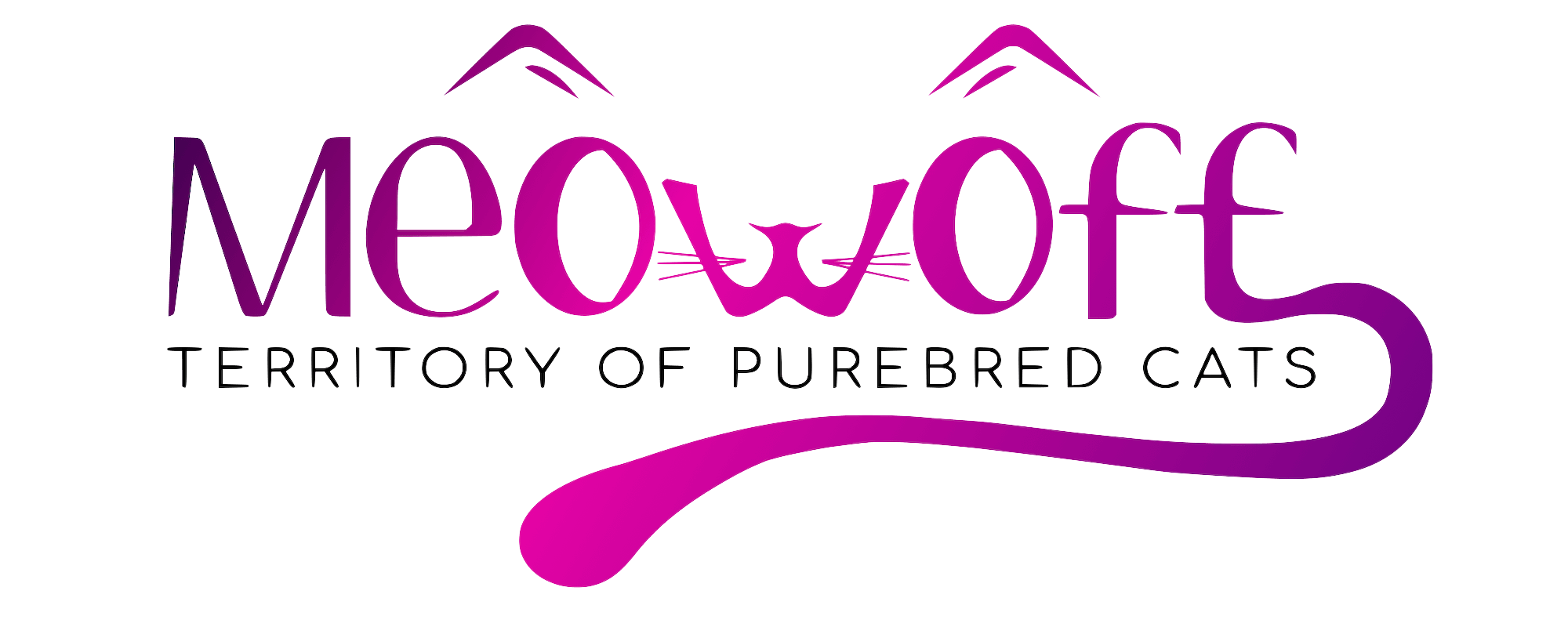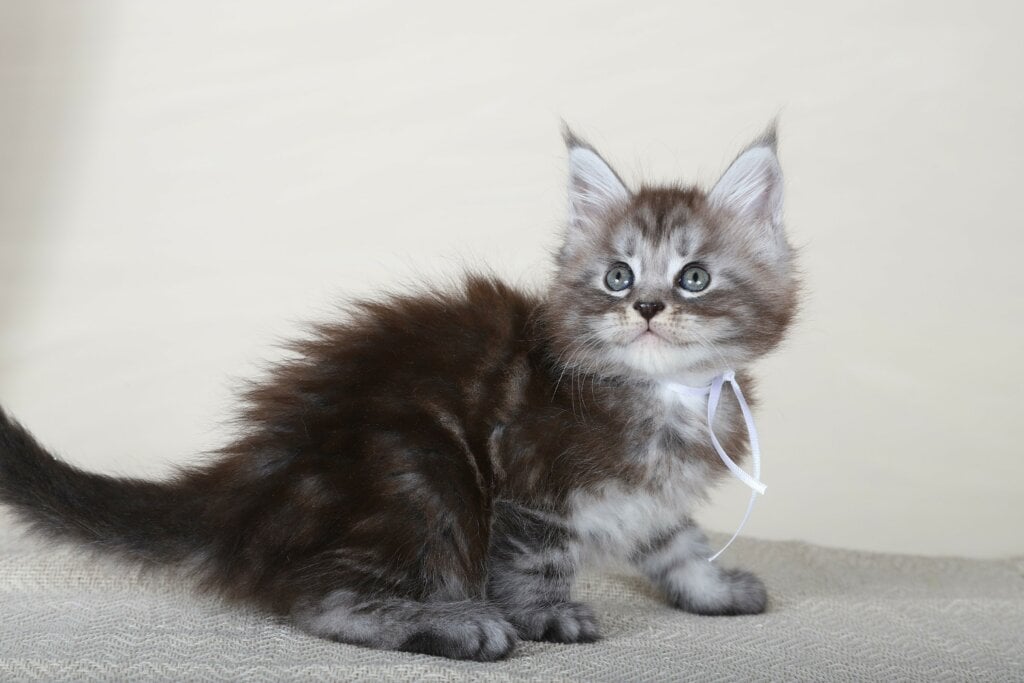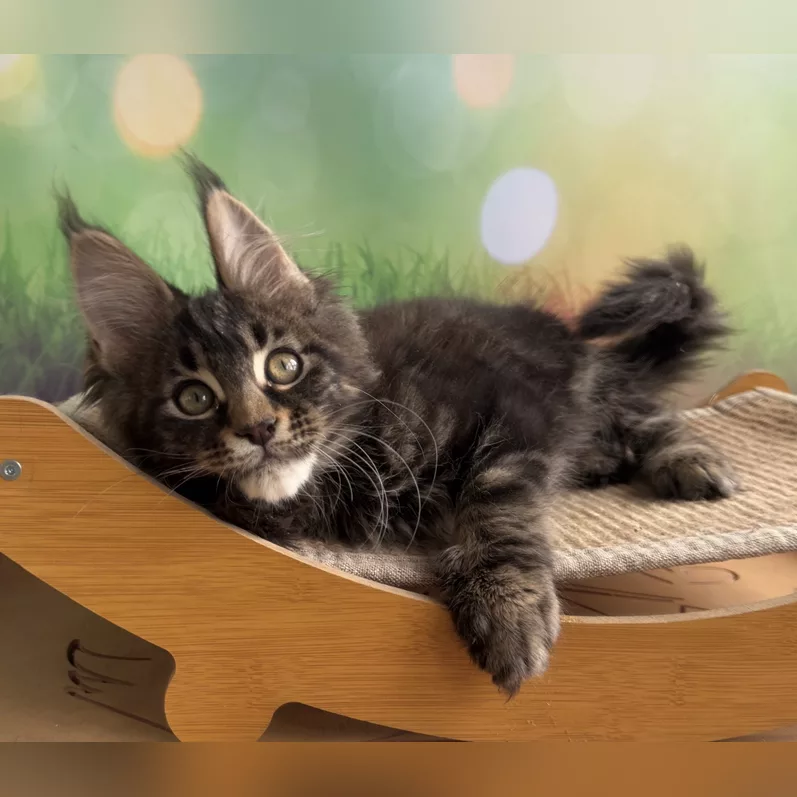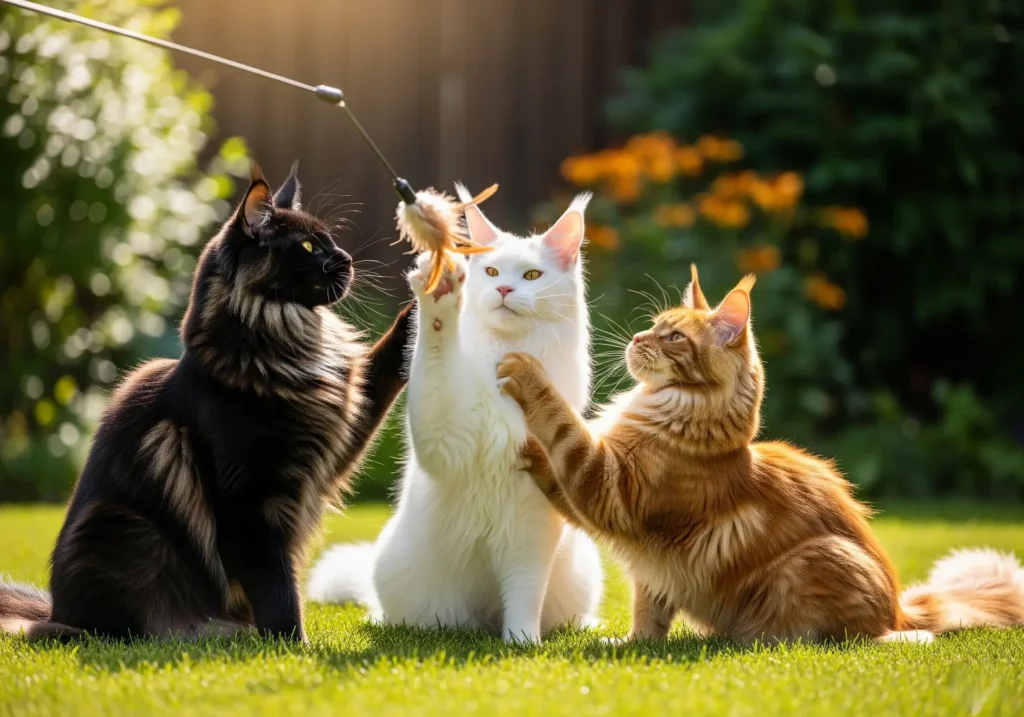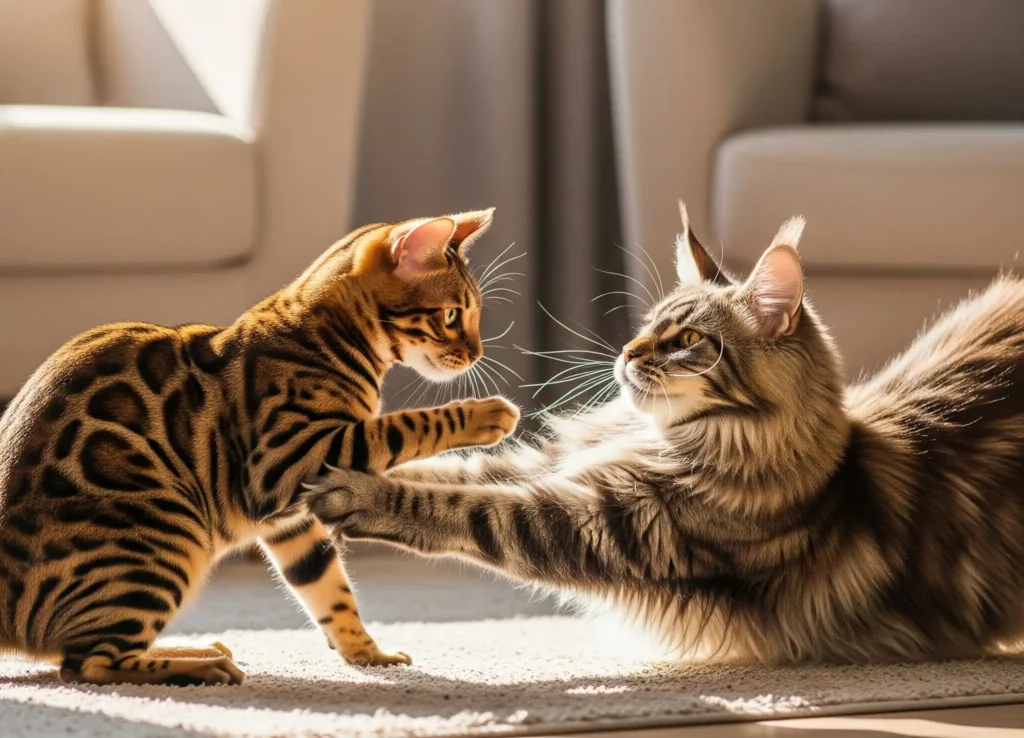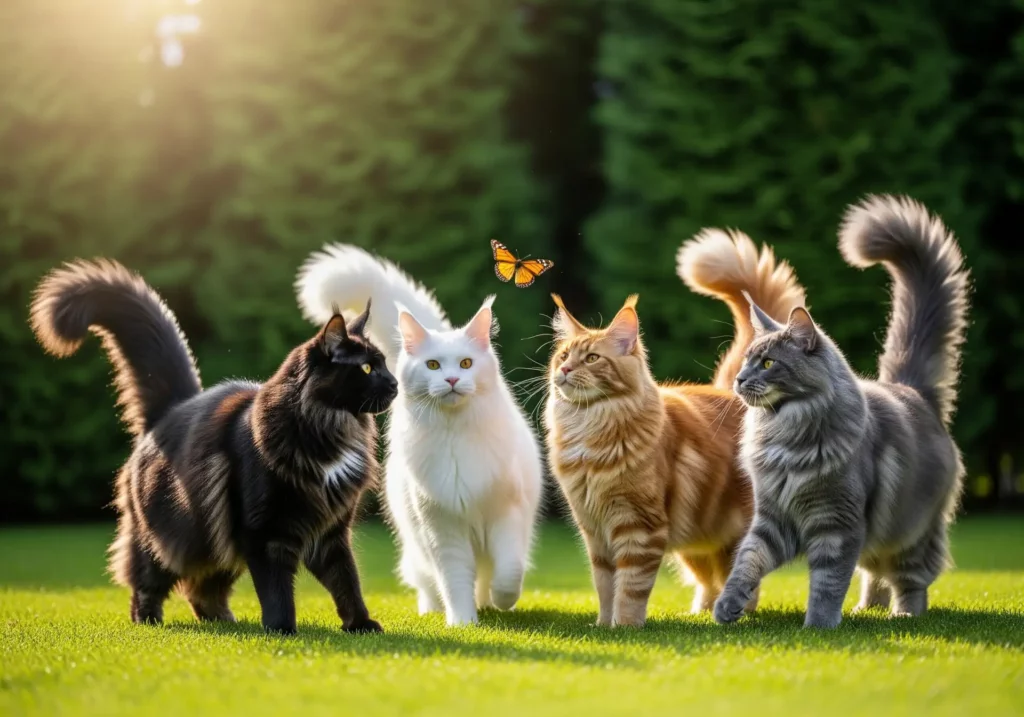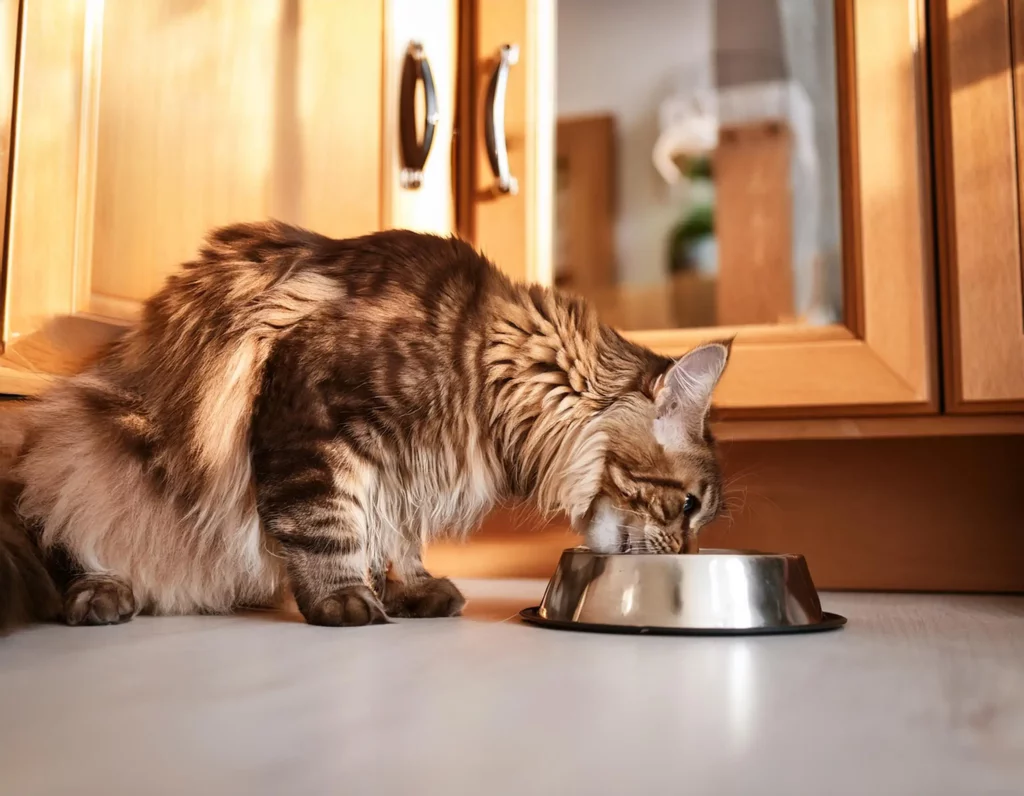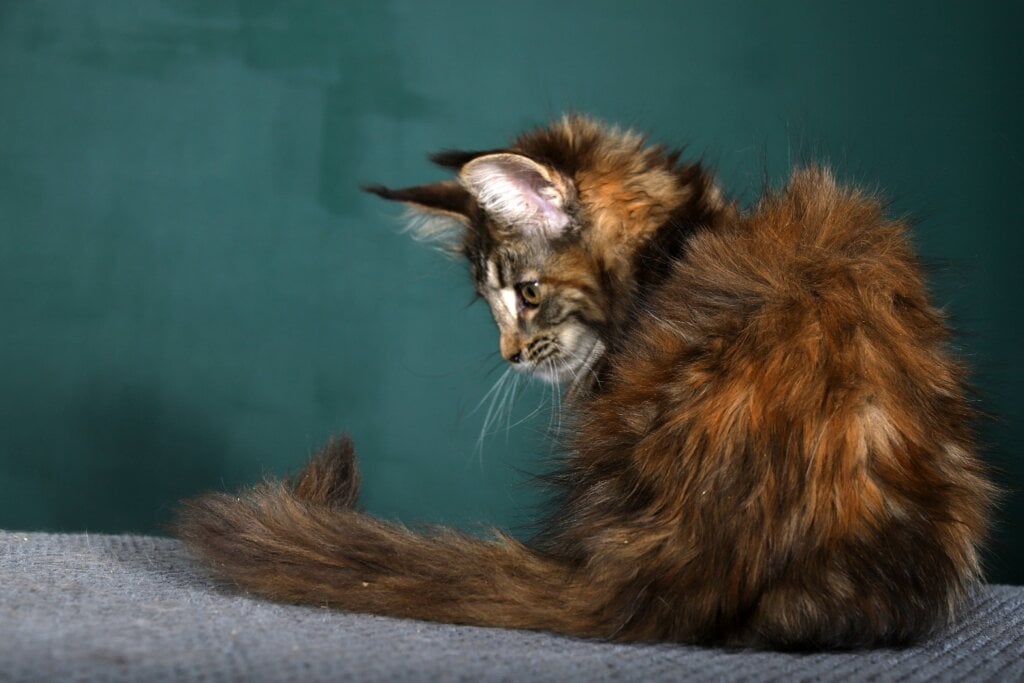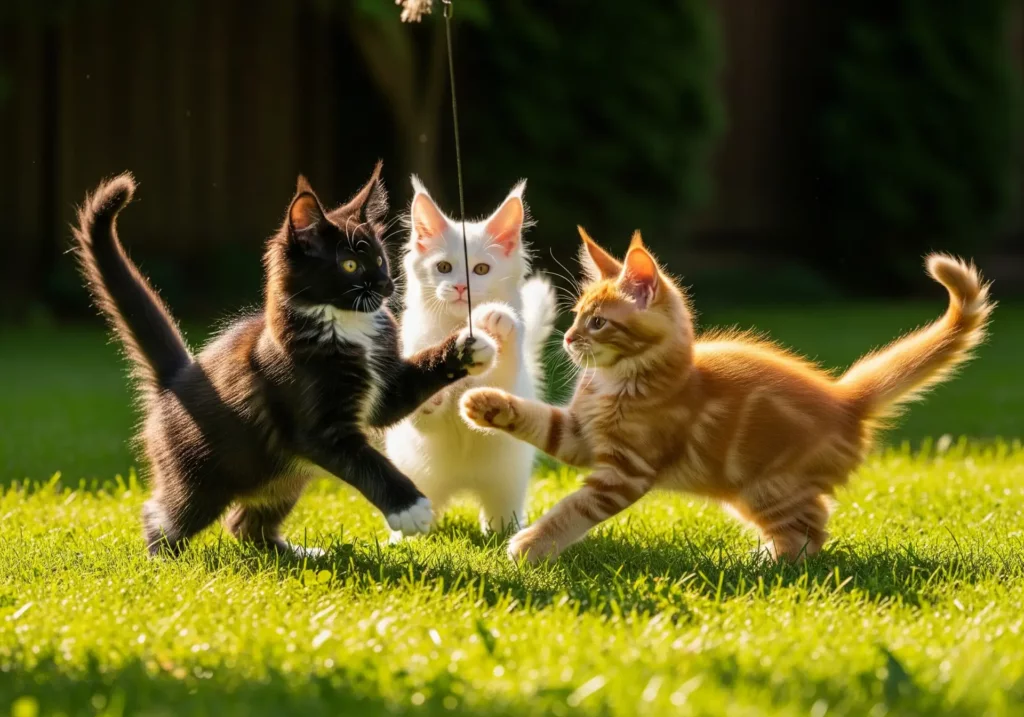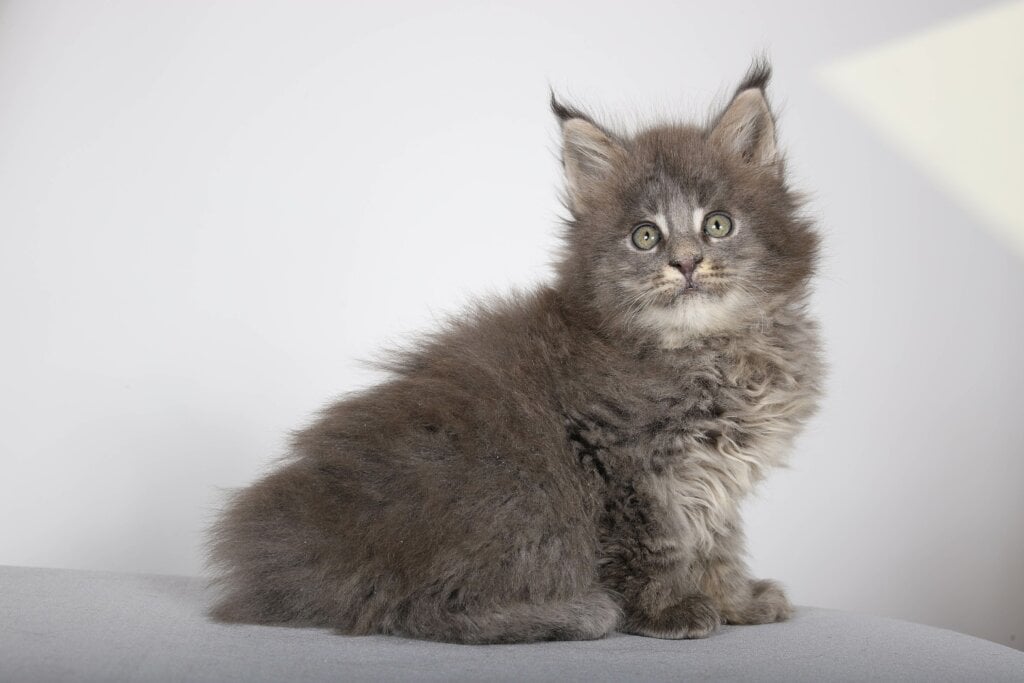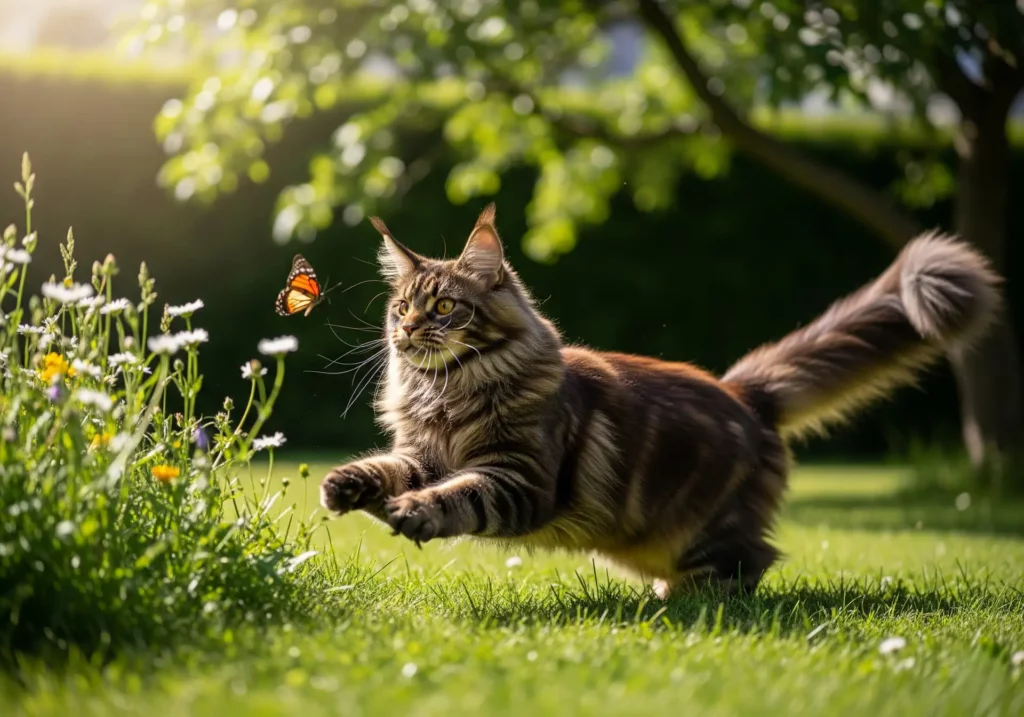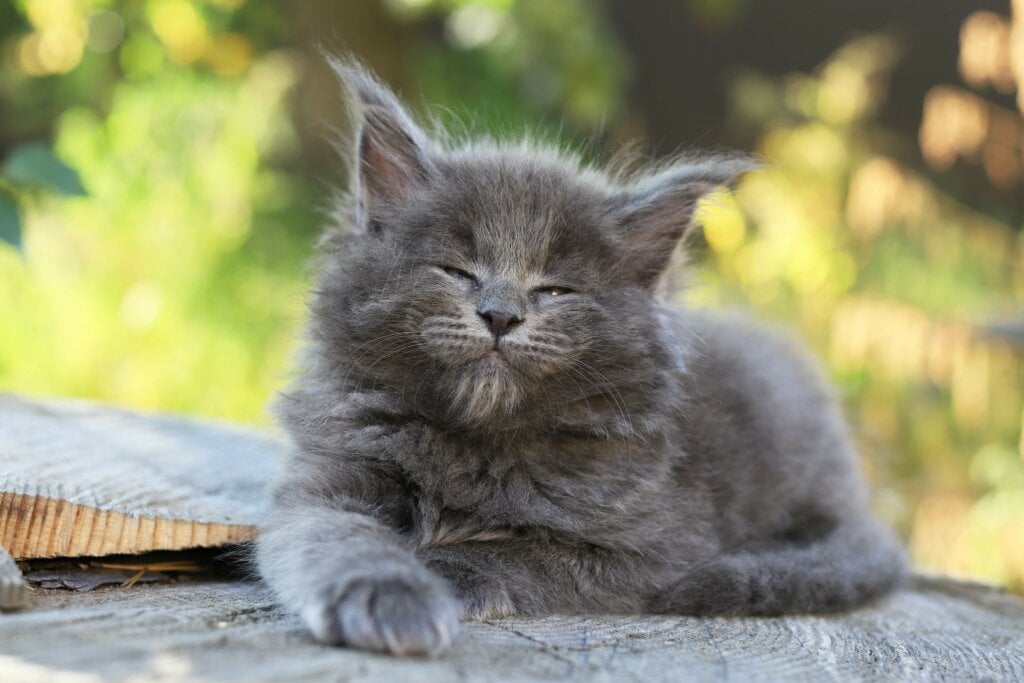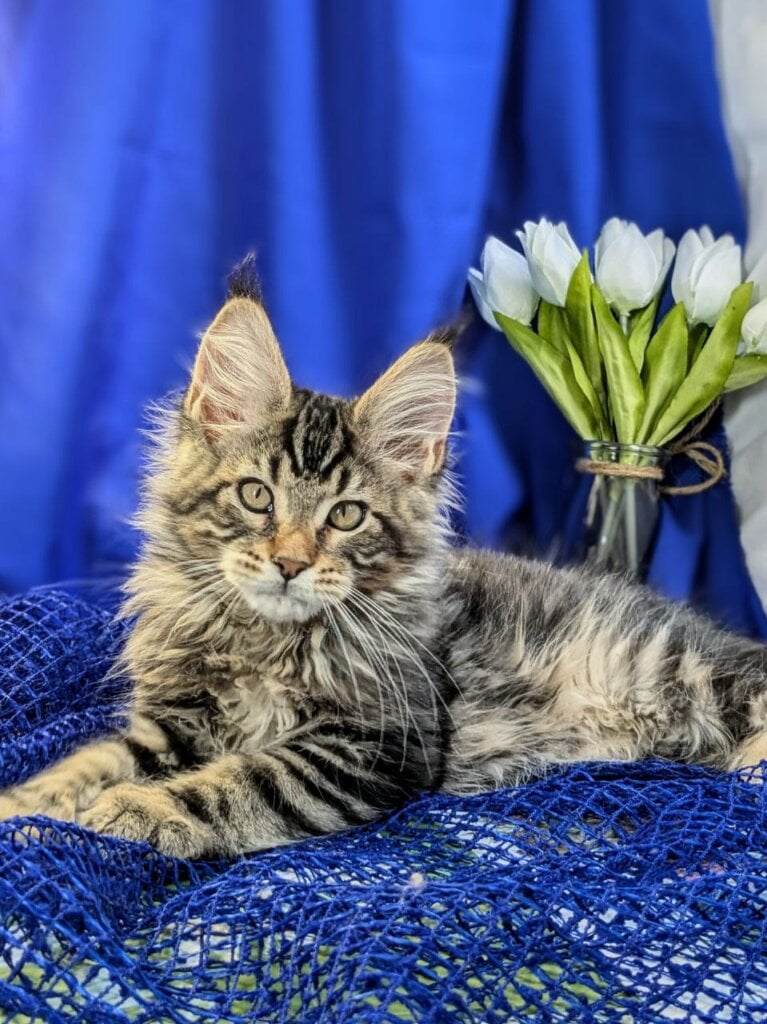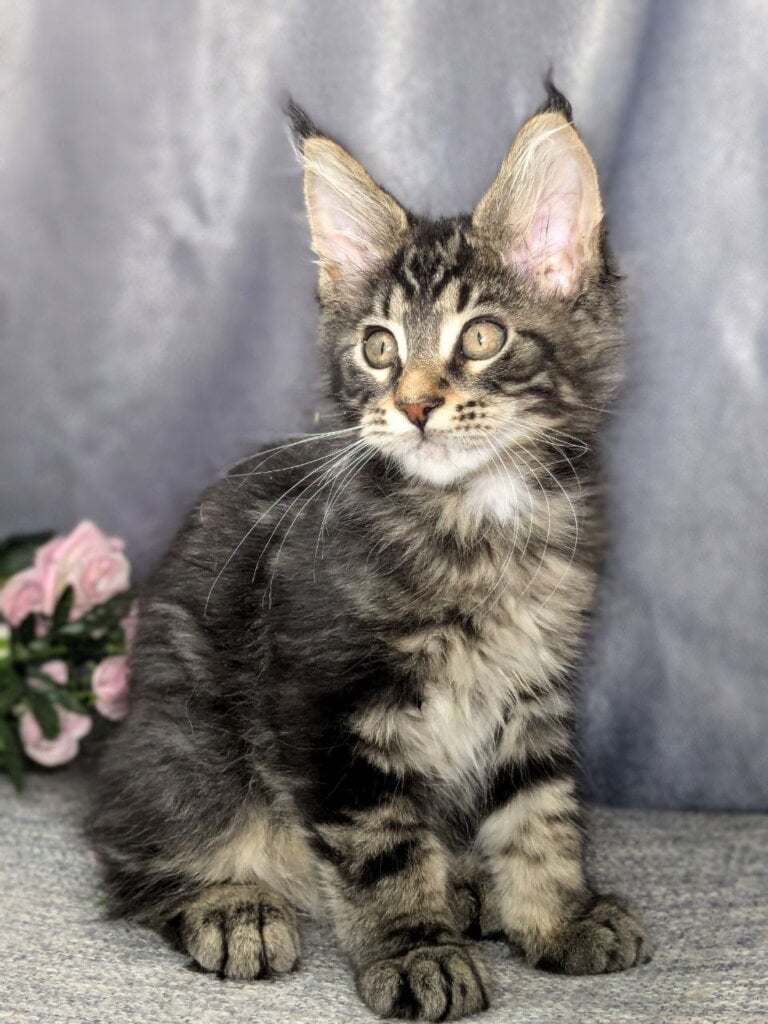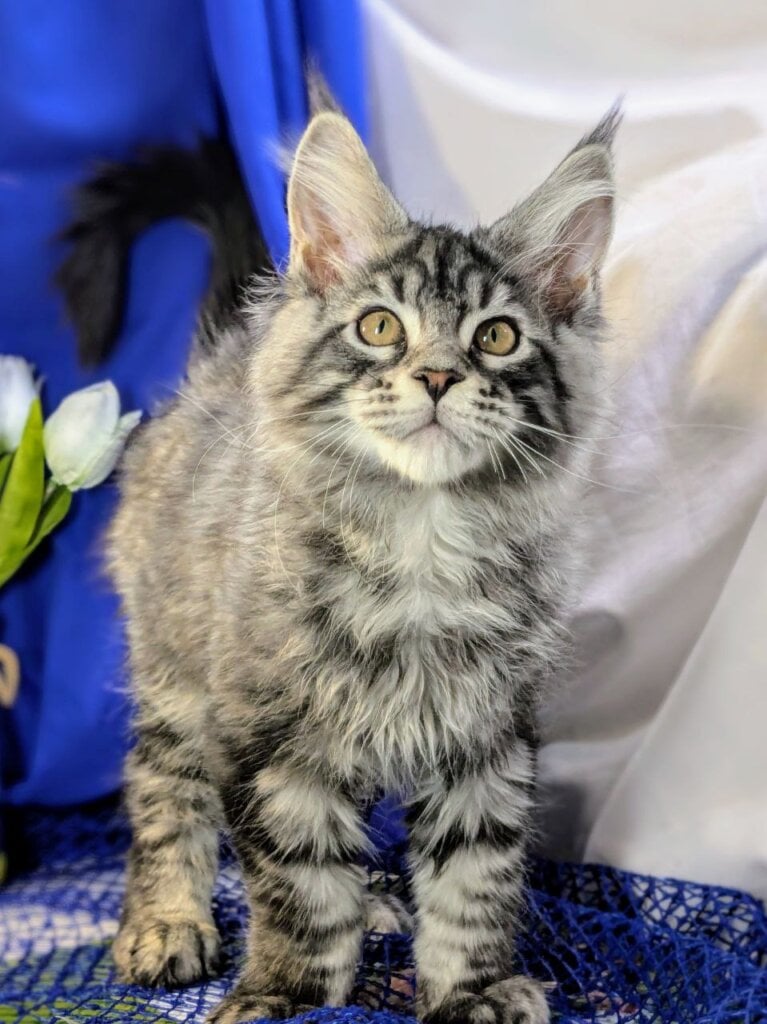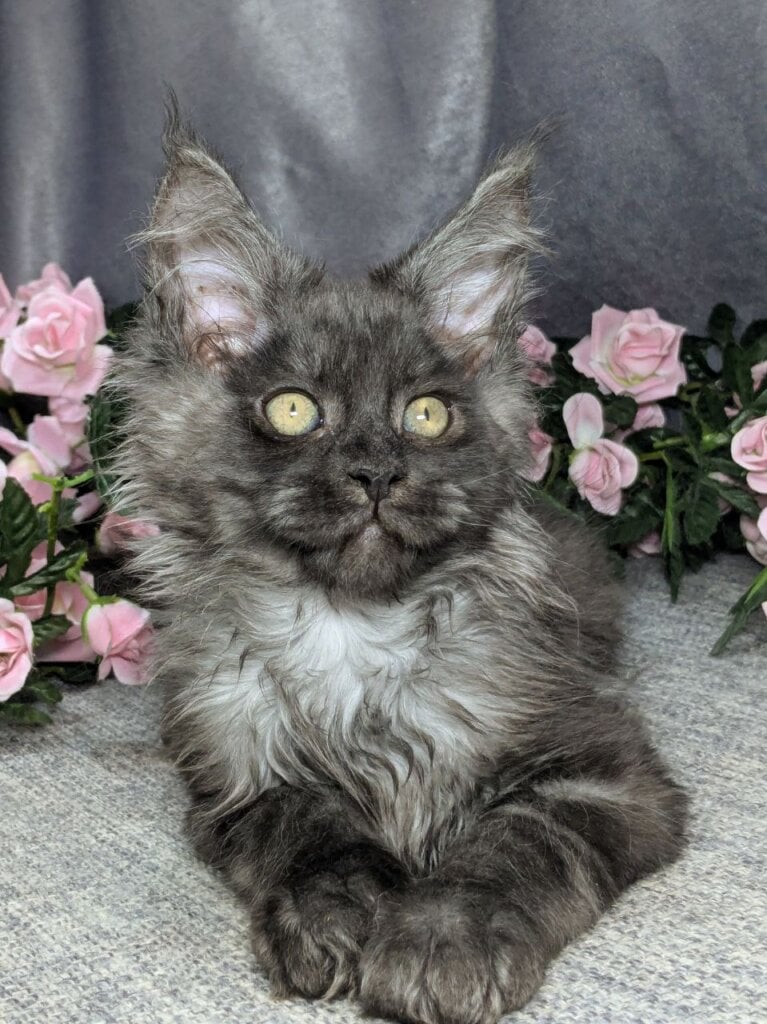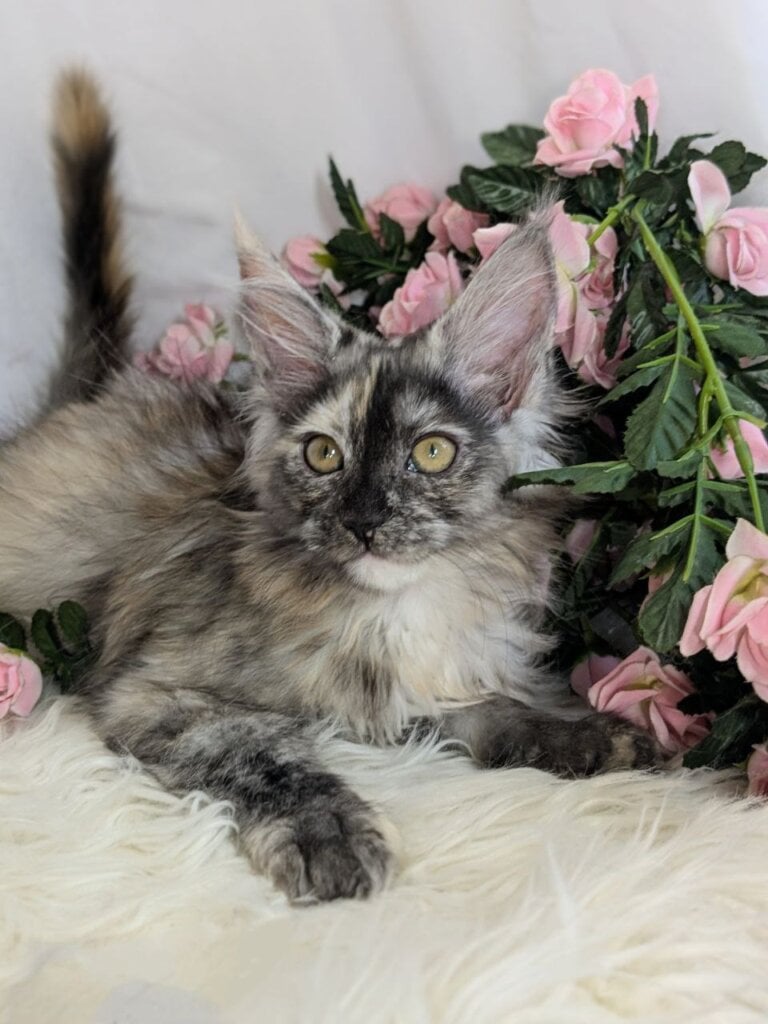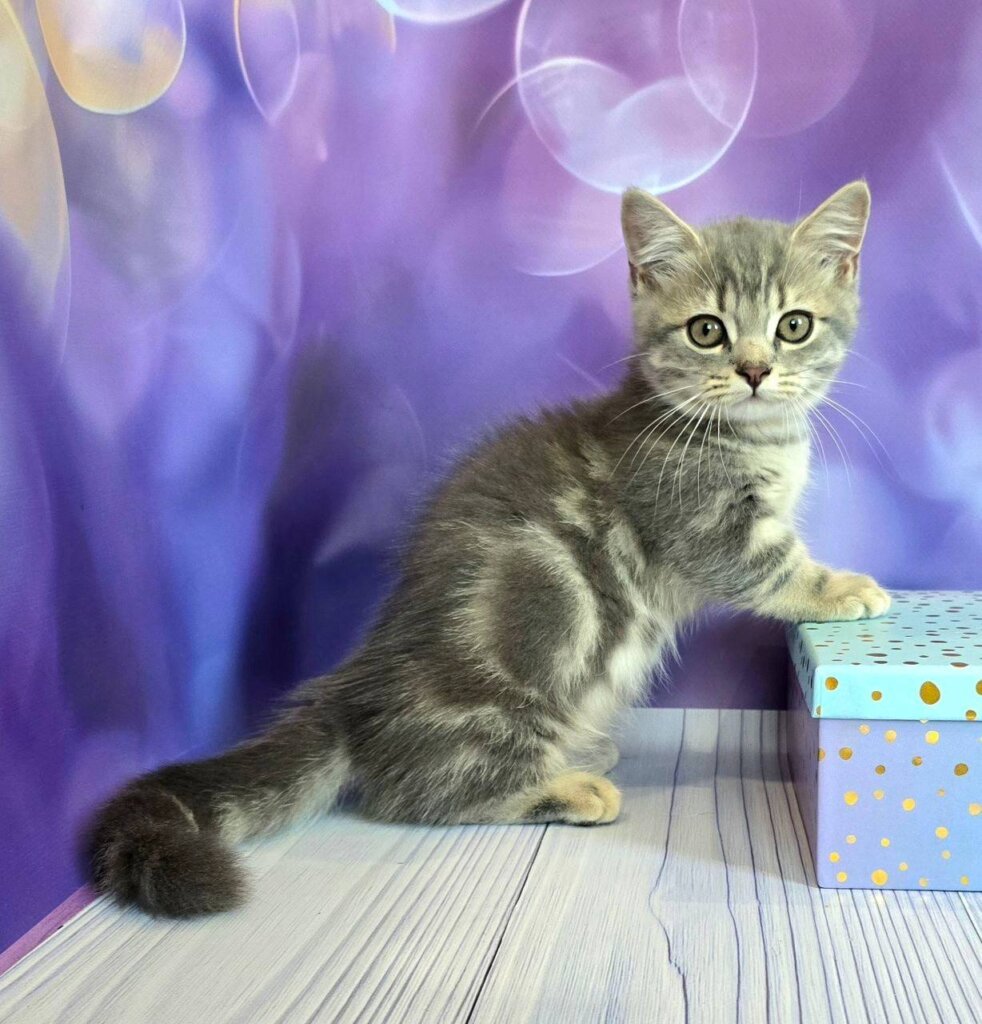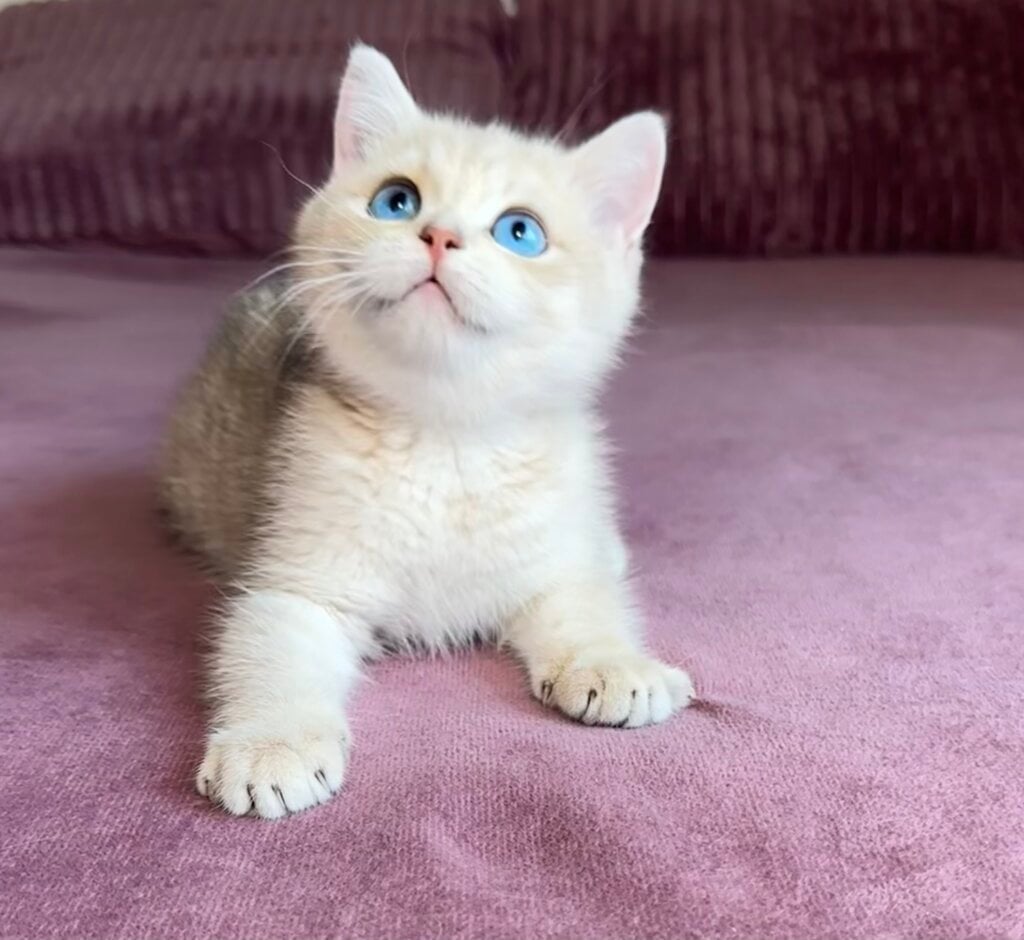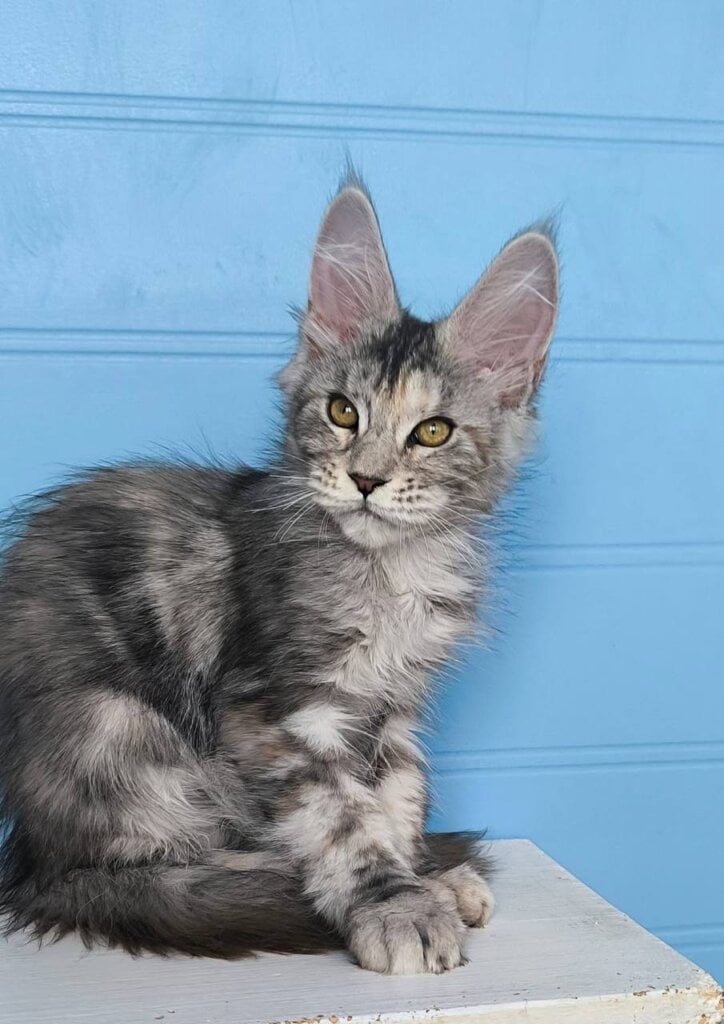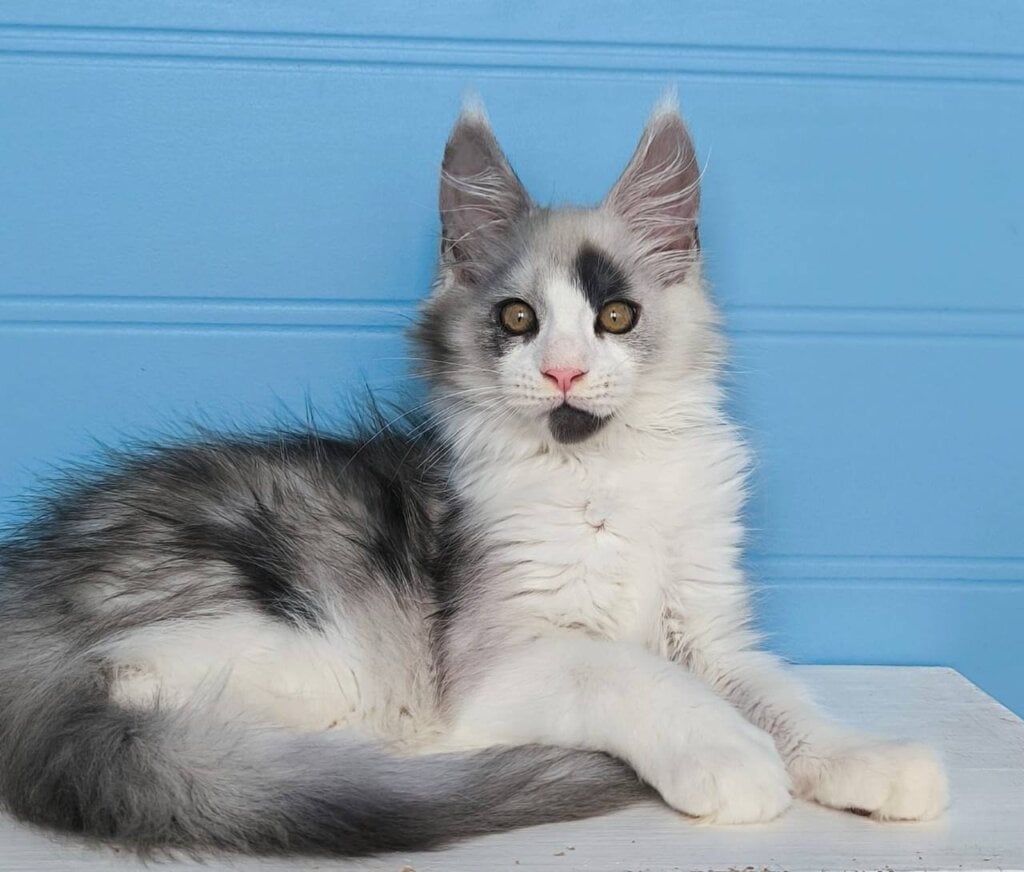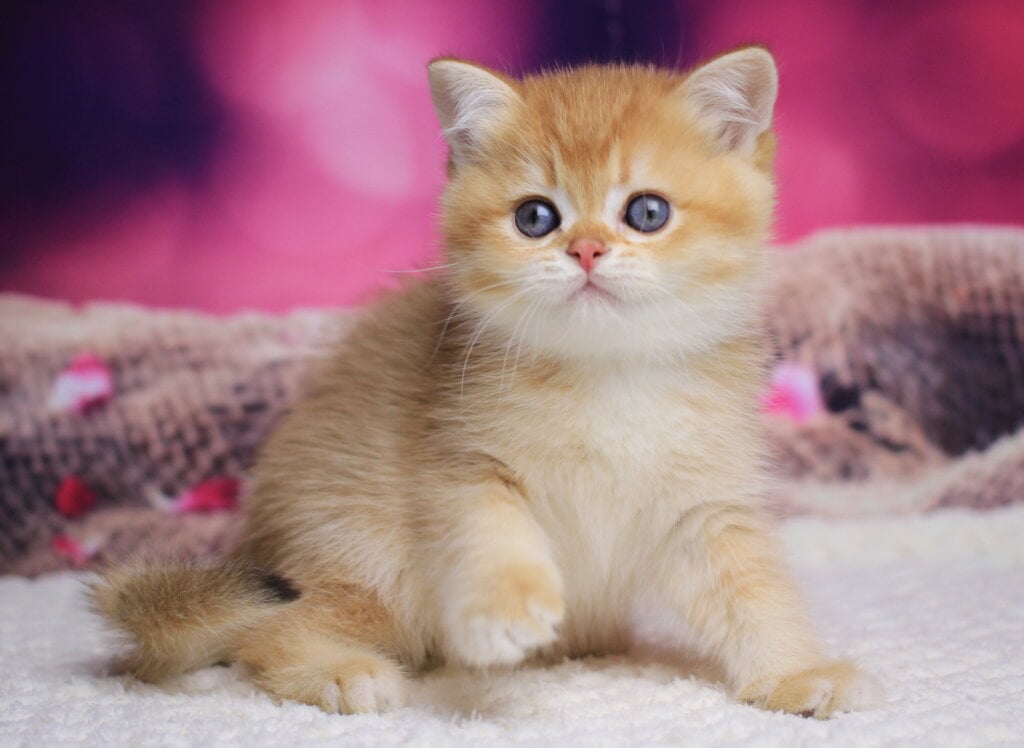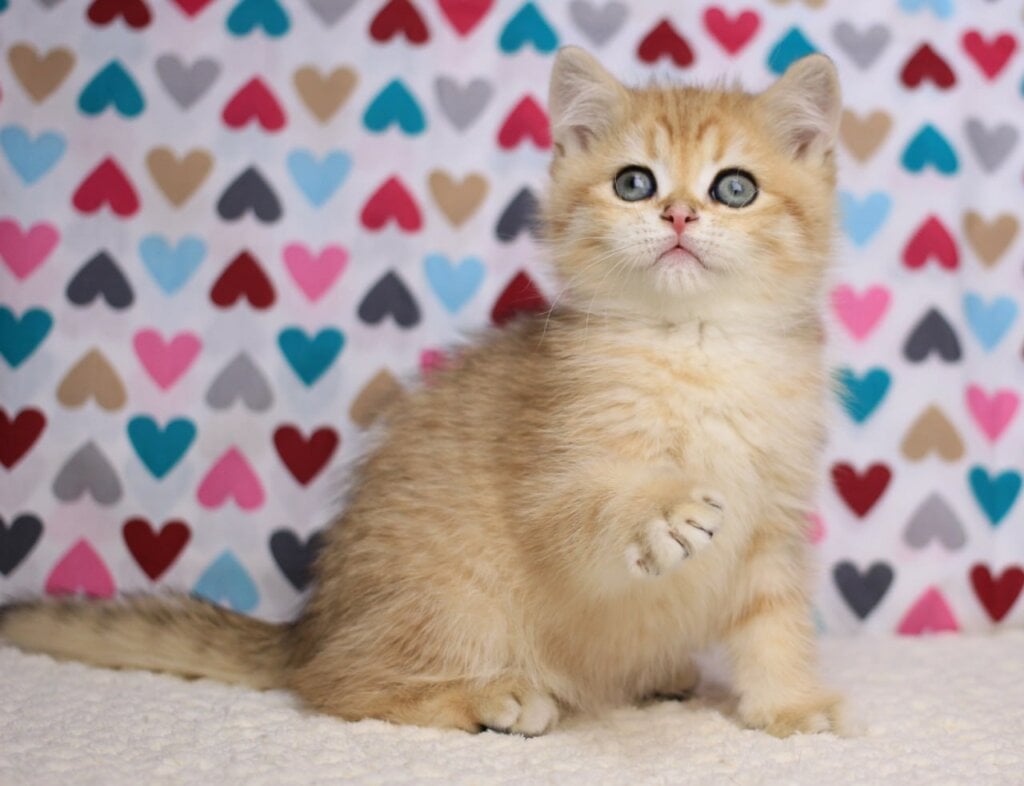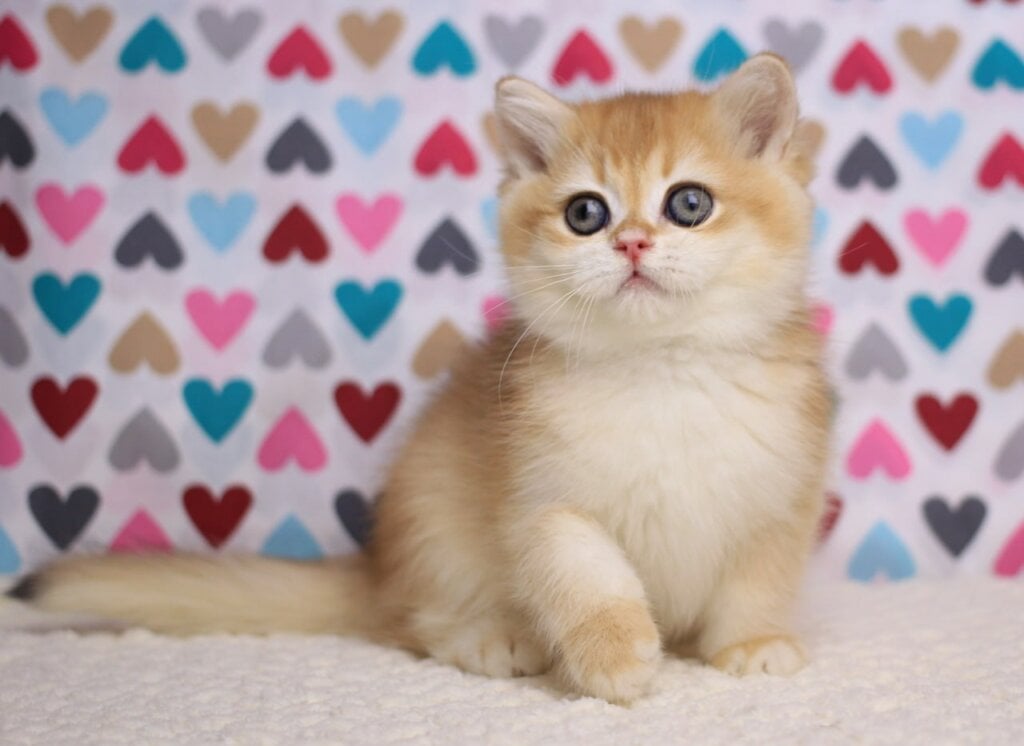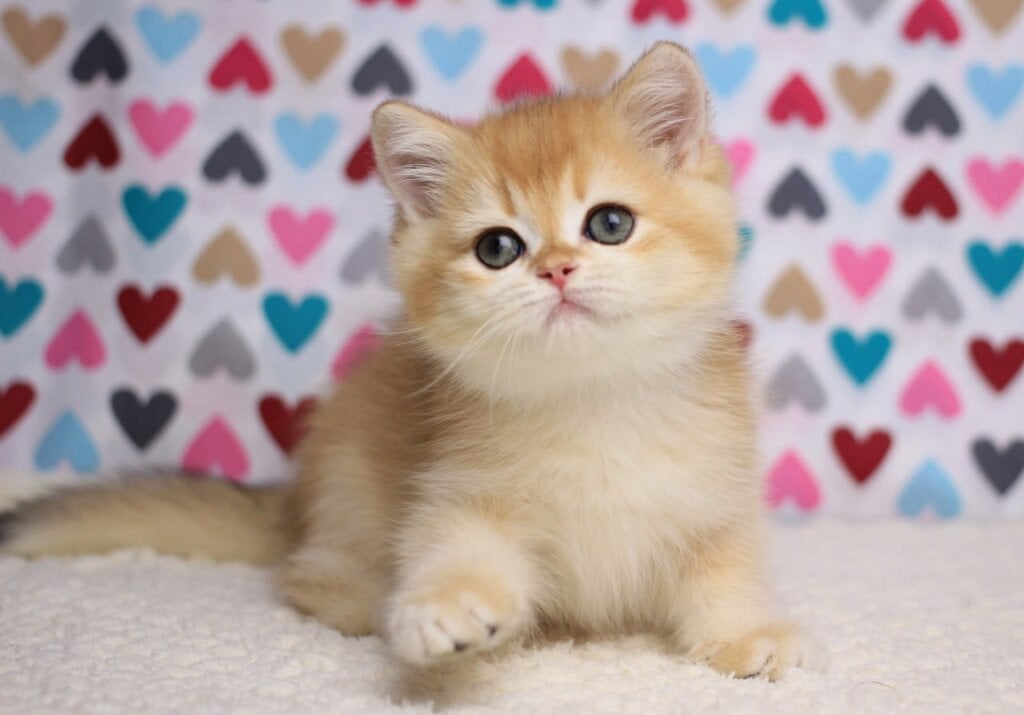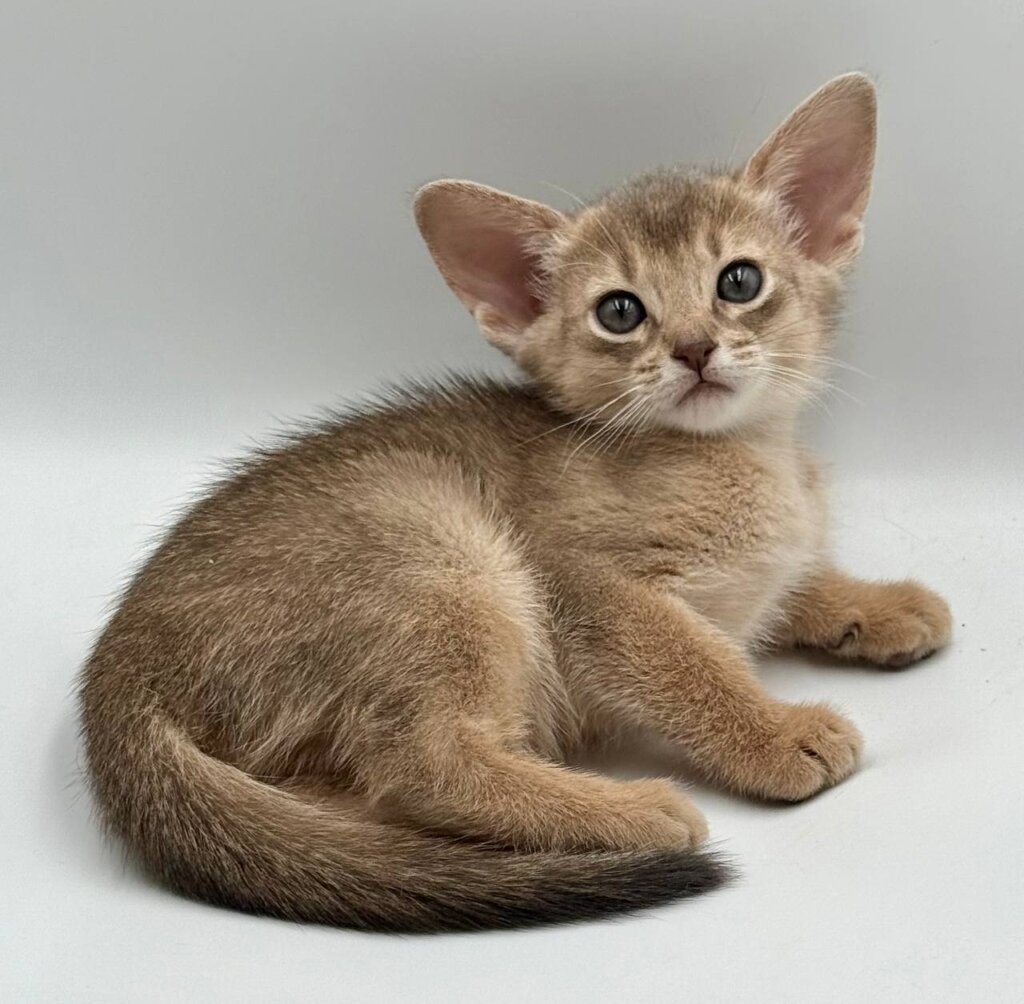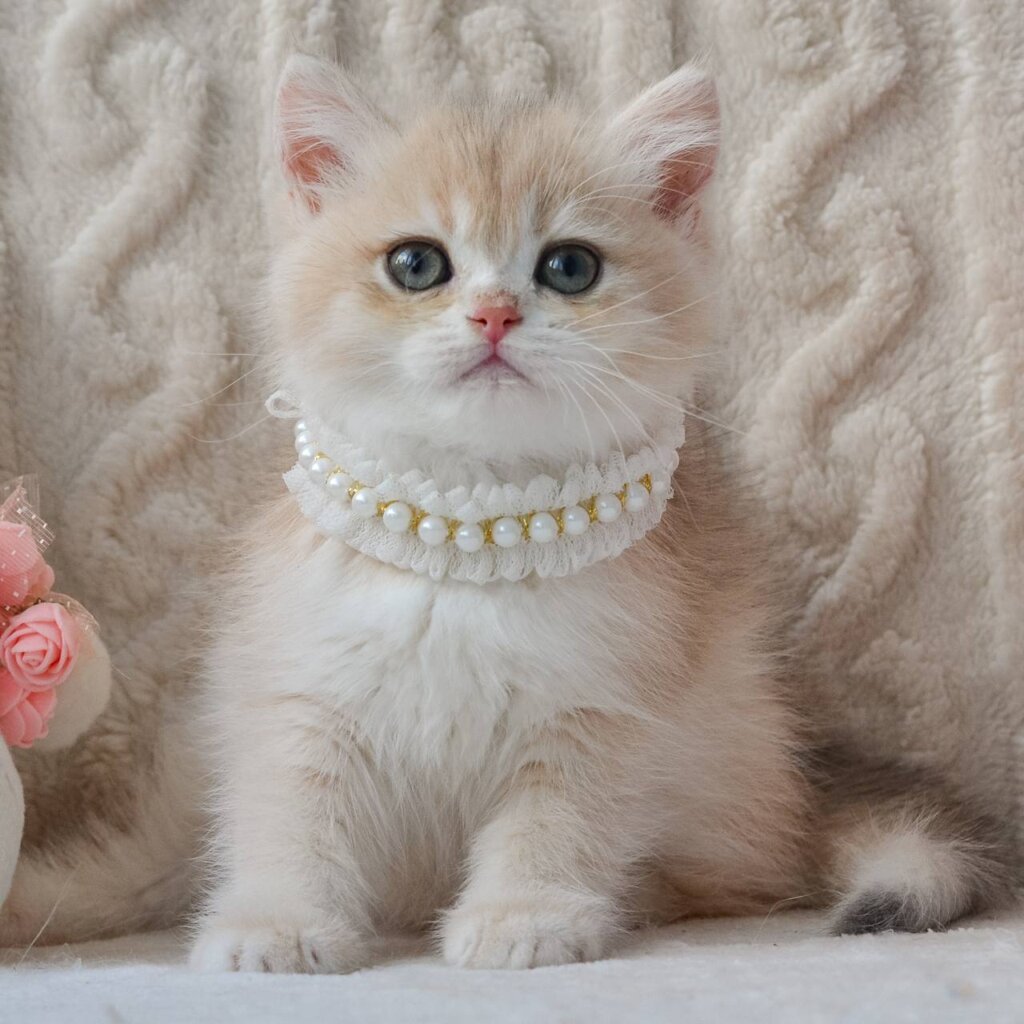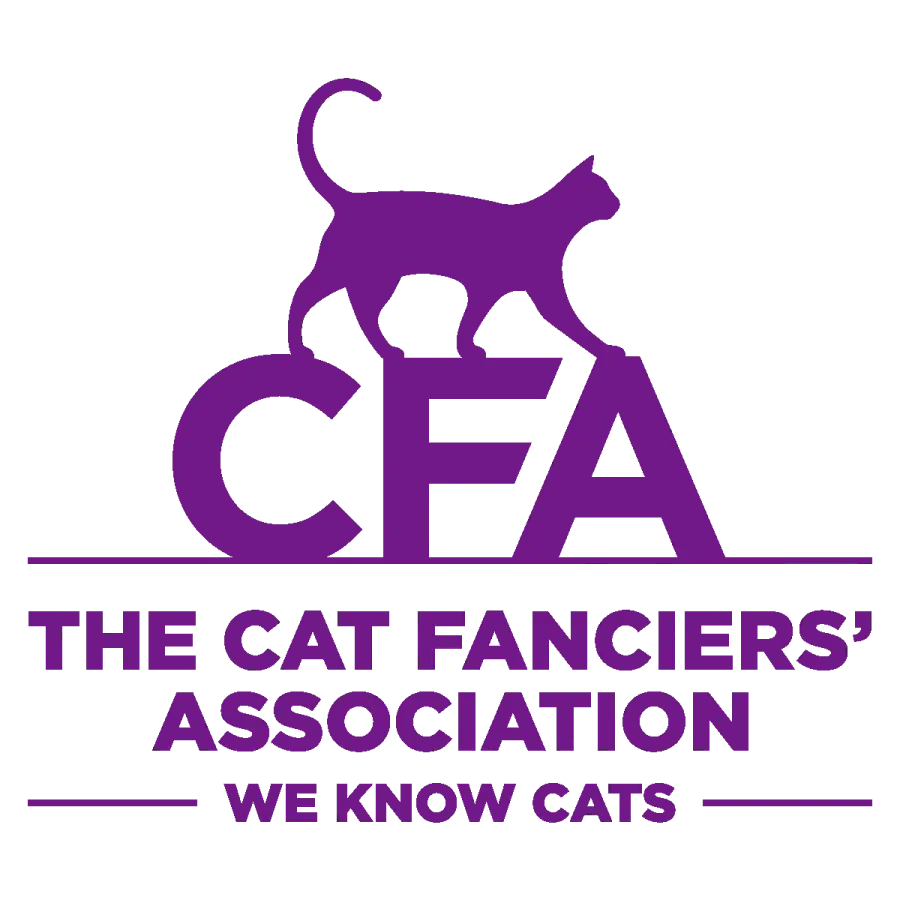Physical Characteristics
Maine Coons are known for their impressive appearance and sweet personality. There are some significant differences between the genders in this breed, both physical and behavioral.
Size and Coat Differences
Size is one of the most talked-about physical characteristics of the Maine Coon, particularly for males. Male Maine Coons typically outweigh females. They normally weigh from 13 to 18 pounds with some individuals even topping the scales at 25 pounds.
In comparison, females typically range from 8 to 12 pounds. This size difference becomes increasingly apparent as Maine Coons get older, with males appearing much more muscular and intimidating.
This size of a male Maine Coon usually shows through in their personalities as well, resulting in a bolder and more outgoing disposition. This larger-than-life behavior can be charming impressionistic color to gigantic impressionistic color, but it’s not unusual for them to require additional space and more attention.
As domestic cats, they require plenty of space to explore and play, something potential owners must keep in consideration. Say hello to Max, a male Maine Coon who enjoyed wandering around his house. Come rain, come shine, he’d never go in the house toilet!
Maine Coons have an impressive coat to match their impressive size – it’s semi-long and dense, giving these cats protection from even the harshest of climates. Since both sexes have this characteristic, males may seem bulkier because of their greater body size.
This is why regular grooming is necessary for their coat’s health and aesthetic and is key to keeping them looking as regal and well-kept as ever.
Color Variations and Patterns
Further contributing to each cat’s individuality, Maine Coons can have coats that are all kinds of colors and patterns. Both male and female Maine Coons exhibit these differences. Some patterns are more frequently observed among one gender.
Frequently seen coloring includes black, white, blue, red, and cream. Patterns range from solid to tabby, tortoiseshell, and bicolor. Maine Coons’ characteristic personality often makes the way they look go hand in hand with their temperament.
As one example, where boys might be rough and tumble, girls might instead be a little more withdrawn and nurturing. Names like Angel, Cleo, Willow, and Molly are common choices for female Maine Coons. These names describe them exceedingly well, as they betray a softer, more delicate nature.
Owners usually notice that even with the size difference, males are surprisingly gentle during playtime – even with smaller female cats. A male Maine Coon, double the size of a younger mix named Ivan, plays softly.
We think this presentation of their charming and flexible nature is just amazing.
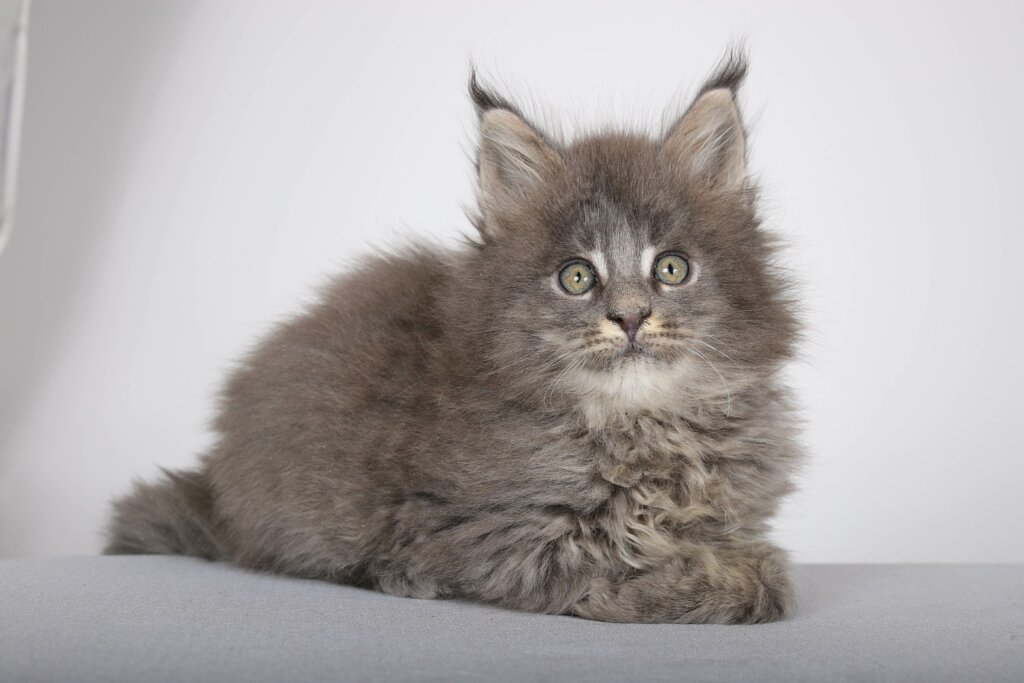
Personality and Temperament
So when you’re looking to adopt or buy a Maine Coon, knowing the differences in personalities between male and female Maine Coons can be super helpful. These gentle giants are known for their friendly and social nature. Both boys and girls are adorable, in their own way! Join us as we explore the charming idiosyncrasies and personality traits that set male and female Maine Coons apart.
Male Maine Coon Charm
Male Maine Coons are especially known for their relaxed and chill dispositions. These cats have a unique ability to center their world around the home with their charming temperaments. Combined with their larger size, often up to 25 pounds, they have an aura of domination and assertiveness.
This doesn’t mean they are pushy; rather, they exude a self-assured aura that most people find reassuring. Playfulness, mischievousness, and childhood malarkey are usually male hallmarks. They’re passionate about doing things that are fun and interesting, that captivate their kids and grandkids.
Their intelligence really comes to light in these instances, with roughly 70% of Maine Coon owners reporting their cats are easy to train. Male Maine Coons are very eager to learn new tricks. They take great pleasure in being the first to welcome any guest, winning hearts in the process with their undeniable beauty.
Female Maine Coon Sass
Female Maine Coons are no less charming than their male counterparts. In fact, they’ve been found to have a more “in your face” personality than their male counterparts. Don’t confuse this sass with standoffishness; these girls are all about the cuddles and love.
With their calm and relaxed temperament, this quality makes them the ideal match for those who want a laidback cat. Although she is usually much smaller in stature than her male counterparts, her diva-like personality shines and demands focus without being overbearing.
They’re every bit as smart and trainable, eager to show off their fast-learning talents. Female Maine Coons are known to be fiercely loyal to their families. Their affectionate personality is as soothing as it is adorable.
Common Temperament Traits
Regardless of gender, Maine Coons have some amazing temperament traits that contribute to their popularity as pets. They’re extremely social and friendly, and have the potential to be amazing companions both for people and other pets.
Their vocal nature is incredibly endearing. They adore to play on a level with their human companions, wonderfully presumptuous taskmasters. While some can be a bit more needy than others, every Maine Coon’s personality is marked by a gentle and loving nature.
Their inquisitive, fun-loving personality makes them natural explorers and adventurers. They open their doors and fill their homes with joy and laughter. Combined with their intelligence, these traits make them easy to train and fun to work with.
Grooming and Maintenance
Male vs. Female Shedding
Male and female Maine Coons males shed differently. Female Maine Coons shed differently. Maine Coons are known to be heavy shedders. Yet, the gap between them isn’t that large.
Because male Maine Coons tend to be larger, they may shed more just by virtue of having more fur. Shedding in Maine Coons will shed more or less depending on the individual cat’s health, diet, and environment. For both sexes, seasonal shedding may be more pronounced as they switch from summer to winter coats, and vice versa.
Keeping up with regular grooming is key to controlling their heavy shedding. It helps to maintain your pet’s coat and minimizes excess hair around your home. First, brush these gentle giants at least once a week. This ensures their coat is always in tip-top shape and reduces the amount of loose fur.
Many Maine Coon owners discover that using a metal comb daily reduces matting significantly. This is particularly the case at times of year when dogs are shedding their undercoats.
Essential Grooming Tips
Grooming your Maine Coon is about more than making them look pretty. It’s an important part of maintaining your furry companion’s health and happiness! One of the most important steps in this process is brushing.
Regular grooming is essential. Regular brushing once a week will keep their long, luscious fur from forming mats and tangles. For people with a little more time, consider brushing at least once or twice a day. This practice not only keeps your Maine Coon’s coat smooth but strengthens the bond between you and your pet.
Regular grooming sessions, preferably every 2-3 months, are important to prevent matting and to keep your Doodle’s coat healthy and clean. While you’re having them explore during these sessions, take notice of their teeth too. A once weekly brushing should be sufficient to prevent any dental problems from occurring, and will keep your Maine Coon’s mouth in great condition.
Don’t forget to keep their nails short, too. Long, overgrown nails can be painful and even result in serious health problems. Keeping them trimmed is key to maintaining a good look.
Diet is crucial to the health and maintenance of a Maine Coon’s coat. As obligate carnivores, these cats need a diet packed with protein. Their diet must be at least 80% meat/muscle, 10% organs, and 10% bone.
Addressing these dietary needs does more than promote their overall health – it helps with the quality of their coat. By making these grooming and dietary habits part of your daily life, you’ll help keep your Maine Coon healthy and happy for years to come.
These steps not only keep shedding under control and keep their stunning coat in top form, but promote your furry friend’s overall well-being. Grooming is an opportunity to build a deeper connection with your cat. It’s not only good for their health, it makes grooming a pleasurable experience for you both.

Health and Wellness
Male-Specific Health Concerns
Male Maine Coons have a heightened susceptibility to urinary tract problems. If left unchecked, these issues can lead to life-threatening conditions, like urinary blockages. Monitoring their hydration status and providing a healthy diet can go a long way to mitigating these dangers.
Their relatively large size puts them at a higher risk for hip dysplasia. Those heavier frames make them more vulnerable to this debilitating condition. Preventative regular veterinarian check-ups are crucial in detecting these issues early on.
Male Maine Coons can be naturally predisposed to putting on extra pounds. To ensure they stay that way, we need to make sure kids have a chance to play and be active throughout their day.
Female-Specific Health Concerns
Female Maine Coons are still at risk for some breed-specific health problems. For example, they might go through reproductive hormones that can affect their mood and desire to do things or overall health. Spaying alleviates these worries but decreases the likelihood of developing some cancers, too.
Females may be smaller than males, but they are by no means less dangerous. One very serious hereditary condition they can develop is Feline Hypertrophic Cardiomyopathy, which affects their heart. Proper nutrition is a key ingredient in supporting bone and muscle growth through these crucial developing years.
This essential support greatly reduces the risk of developmental problems.
General Health Issues
Whether male or female, Maine Coons have a few common health concerns. As a larger breed, they are susceptible to hip dysplasia, a degenerative condition that takes away their ability to walk in later years. Eating a healthy diet and getting regular physical activity will help you maintain a healthy weight and manage this problem.
As with most purebred felines, Maine Coons can be predisposed to certain conditions, including Feline Hypertrophic Cardiomyopathy. That’s why regular veterinary screenings are the key to ensuring conditions are detected and managed as early as possible.
Maine Coons are further distinguished by their long, thick coats, which need to be groomed regularly to avoid matting. While they require little grooming, she advises a once-a-week brush will keep their coat in tip-top shape and cut down on shedding.
Vaccinations
Vaccinations are the key to protecting your cat from serious, common diseases. They protect against Feline infectious enteritis, Cat Flu and Feline leukemia virus.
Last but not least, their diet has a huge impact on their physical wellbeing. A high-quality, protein-rich diet supports developing muscle and bone development in kittens. This foundation is key to their healthy development.
This breed usually averages a lifespan of over 12.5 years. With an emphasis on prevention and a commitment to a long, healthy life, you can do your best to help your pet live a long, happy life.
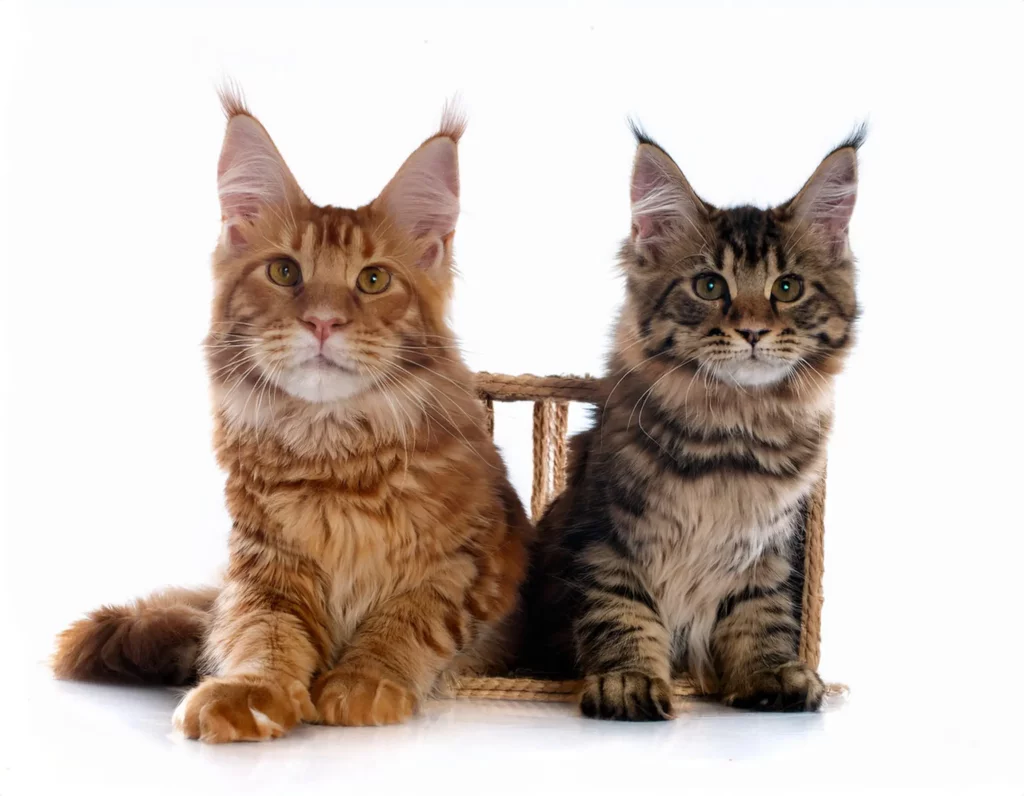
Training and Behavior
1. Training Male Maine Coons
Male Maine Coons are popular for their intelligent, outgoing personalities. They usually present a healthy mix of patience and tolerance that truly makes them the best family dogs with children. These adorable behemoths are extremely responsive to the slightest touch.
They are easily trainable, learning to fetch toys and respond to basic commands like “sit” or “stay” in no time. With that lively and slightly mischievous spirit, they require a lot of quality, active playtime that will provide both mental and physical exercise. Laser pointer games and feather wand chases are the ideal outlets for that energy.
Most importantly, they help pets stay mentally and physically exercised! When you factor in social dynamics, two male Maine Coons usually makes for a peaceful home. They just love being around each other and sometimes end up truly soul mates.
This allows them to dodge the territorial conflicts that develop in mixed or all-female pairs. Each male can be a source of stimulation and engagement for the other, helping to lessen the risk of boredom.
2. Training Female Maine Coons
Female Maine Coons, for example, are noticeably pet-like. As a breed, they have a reputation for being strong-willed and independent thinkers, which can be interpreted at times as aloofness. Even so, females do enjoy sharing time with their owners and can be devoted, loving pets.
Training them takes a lot of patience and sometimes firm leadership with strong boundaries to train their vivacious spirits. Positive reinforcement methods, employing food rewards and verbal praise, work to build trust and repeat desired behavior.
Additionally, females might just not be as playful as males. Yet, they continue to receive enormous advantages from frequent interaction and psychological excitement. Puzzle toys and treat dispensers are great ways to stimulate your dog’s brain and help them burn off excess energy.
It’s important to give them a lot of quality attention and activity to keep them from being bored and acting out destructively.
3. Socialization Techniques
Socialization is key to ensuring both male and female Maine Coons are well-behaved. Providing early exposure to different environments, people, and other pets will assist in their growth as a well-rounded cat. With males, proper socialization can bring out their natural patience and tolerance, making them even more suited to a variety of family situations.
We find that females almost always have an independent streak. Gradual introductions and positive reinforcement will go a long way to earning their trust and easing their anxiety.
Whether your Maine Coon is male or female, the most important thing to remember is that no two Maine Coons are alike. What works perfectly for one cat will not work for another.
It’s important to use one-on-one strategies that are appropriate to the individual cat’s personality and needs. Recognizing and tailoring to these unique characteristics makes for a pleasant and joyful cohabitation.
Living Environment Preferences
Homes for Male Maine Coons
Male Maine Coons are particularly large, requiring a large living environment. These magnificent felines do best in spaces with lots of room to explore and stretch their legs. A roomy dwelling is best, not only side to side but up and down as well.
Things like tall cat trees or shelves can provide these felines the excitement they seek. Any male Maine Coons owners would attune to noticing how much these felines enjoy exploring every corner of their residence. They especially like to discover high spots to roost and climb.
Having a backyard or access to a safe, outdoor space makes their living environment so much better. It gives them a great space to experience and play in. I remember my large male Maine Coon very well. He lived long enough to never sit on an indoor toilet, as he enjoyed going on outdoor excursions, rain or shine.
If you have a small apartment, then a male Maine Coon might not be the ideal match for you. They can become unpredictable, erratic, even aggressive when deprived of adequate stimulating activity to prevent them from boredom.
Ideal Spaces for Female Maine Coons
Females Maine Coons are much more suited to confined living spaces. Their typical shorter coats and lower maintenance requirements lend themselves to being more easily cared for in smaller environments.
If your home is on the smaller side, you may want to consider a female Maine Coon. Although they continue to climb and play like boys, they need less room than their male peers. Given sufficient playtime and stimulation, a female Maine Coon would do well in a more compact, comfortable space.
They still love the addition of vertical elements to scale and extensive interactive play equipment to occupy them. Anecdotal evidence from owners suggests that female Maine Coons are equally as playful and active as their male counterparts. This is particularly the case when their environments support their ability to be active and playful.
Considerations for Both
If you’re thinking about adopting a Maine Coon, consider your living environment as you make the decision about which pet is the right fit. Both male and female Maine Coons do best in environments where they have lots of room to play and get exercise.
Males do best in larger environments with vertical territory, like tall scratching posts. In reality, females are perfectly able to adjust to tighter quarters if provided the proper consideration.
In surveys, 80% of Maine Coon owners report that their kittens are more energetic if they live in spacious environments. This really underscored just how important space is for these animals.
So, whether you opt for a male or female, offering an engaging habitat will result in an enjoyable, healthy pet.

Myths and Facts
Debunking Common Myths
When it comes to Maine Coons, myths abound that can obscure what most people need to know about these gentle giants. Another misconception is that female Maine Coons are less affectionate than males. Females in particular can be more free thinkers. They remain, at heart, madly in love with their humans.
They’re incredibly affectionate, relishing peaceful time spent in the company of their humans. In contrast, male Maine Coons have a reputation for being more social and tolerant, especially with kids. Their easy-going attitude makes them wonderful companions, refuting the myth that males are only rowdy.
Another prevalent Maine Coon myth is that they are untrainable. In truth, the boys are just as trainable, but because they’re boys, they’re not as readily trainable. They are quick to learn and readily respond to positive reinforcement techniques, so they are a treat to train for tricks or even basic commands.
Females, always thought to be more aloof than males, can be easily trained when their independence is appreciated. The fact that they’re not known for being stubborn makes it a myth that Maine Coons are untrainable. Their intelligence makes them great at picking up on cues.
True Facts About Maine Coons
Getting into the nitty gritty, Maine Coons are the 3rd largest domesticated cat breed. Adult male Maine Coons often weigh anywhere from 18-22 lbs. In comparison, females typically only weigh 9 to 13 pounds, so the males are almost double their size.
The reason for this size difference is not only the weight but the length with males typically being larger and longer. Myth #1 – Maine Coons are aggressive Maine Coons have a reputation as gentle giants. Even when they have the upper hand in size, males and females alike exhibit a peaceful, laid-back attitude.
Another fun fact about female Maine Coons is their grooming needs. In part because their coats tend to be shorter than male counterparts, they are easier to maintain. This trait is a major plus for cat owners who love cats but are intimidated by grooming responsibility.
Male Maine Coons have beautiful longer fur that needs more maintenance. Grooming on a regular basis prevents their long coats from getting matted and maintains a healthy coat overall.
So it’s important to know what health issues to watch out for in Maine Coons. Approximately 13-18% of them are at risk for Feline-Specific Polycystic Kidney Disease (PKD), a genetic disorder that affects both males and females.
Regular veterinary check-ups and awareness of their genetic predispositions can help ensure that your Maine Coon remains healthy and happy. Knowledge of these facts will allow newfound enthusiasts to make responsible choices regarding this special breed. This background empowers them to deliver the most appropriate care.
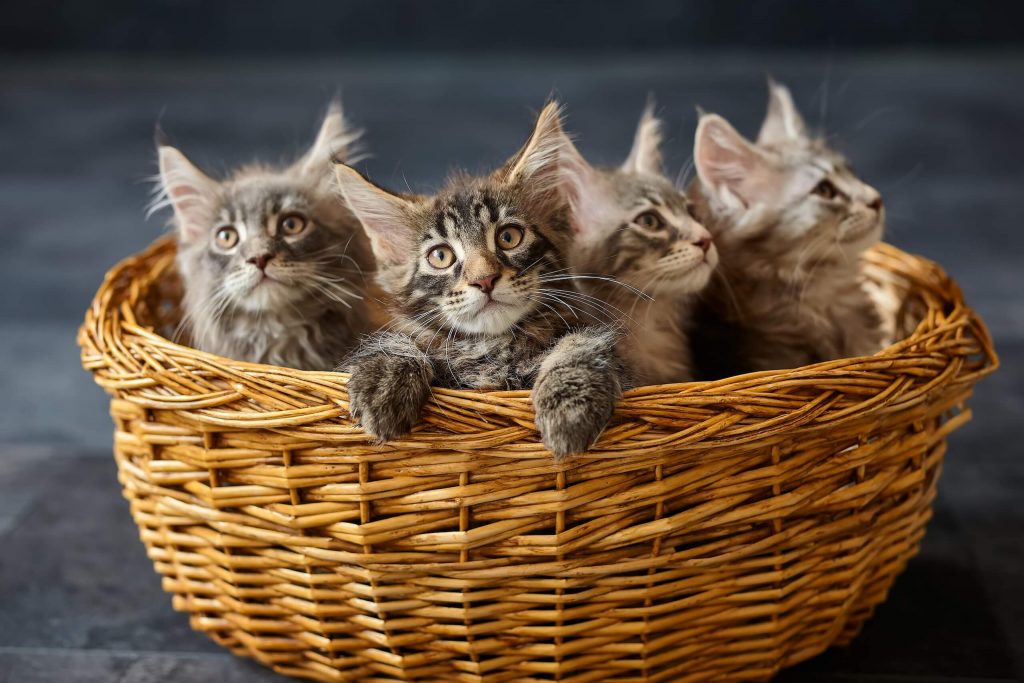
Choosing Your Maine Coon
When considering adopting a Maine Coon, look out for the distinctions between male and female cats. These differences can have a huge impact on your decision. These gentle giants are easily recognizable for their huge stature and sweet disposition. Their quirky personalities and loving nature combine to make them a truly wonderful companion and addition to any household.
Here are some important factors to consider to ensure you select the best Maine Coon for your lifestyle.
Matching with Lifestyle
Social and amiable Maine Coons, male and female alike, are great family pets. An incredible 80% of cat owners report their felines as extremely loving. This sweet disposition combined with their playful personalities make these cats perfect companions for families and single adults.
Males are typically larger, usually topping out between 15 to 25 lbs. This size variation is a constant, as adult males are generally around 4 pounds heavier than females. If you have very little space or want a smaller cat, you might want to get a female Maine Coon. Maybe she’s the right one for your household!
Their smaller stature certainly doesn’t stop them. Both genders typically do well together and with other animals, highlighting their friendly, outgoing spirit. Don’t forget the cute Maine Coons have a cute playful side, too, making them loving and entertaining companions.
Male or female cats of any age enjoy making their loved ones happy. While males might be more boisterous due to their size, females often exhibit a calm demeanor that fits well in quieter households. Understanding how a cat’s energy levels and sociability align with your daily life and household is key.
Factors to Consider
In summary, when selecting your Maine Coon, don’t focus solely on size and personality. The key is to look for the right fit for your home and lifestyle! So, whether male or female, each cat has much to offer and adds a special flavor to the mix.
Though the males are impressively bigger, the females still provide all the classic Maine Coon features in a somewhat daintier package. This size variation, usually a couple of pounds, may play a big role in your decision if you are short on space.
Beyond physical characteristics, think about the social environment within your home. Despite their size, Maine Coons have an incredible knack for acclimatizing to various environments. Their social nature makes them ideal playmates for households with kids and other animals.
Their impressive knack for being agreeable with everyone guarantees a happy home life. When making your decision, consider the factors you value most and the traits you most want in a companion animal.
